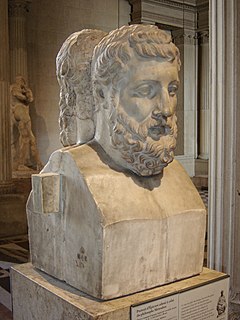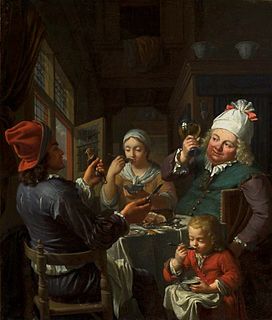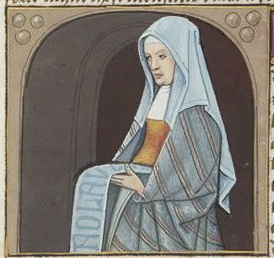
Epicurus was an ancient Greek philosopher and sage who founded Epicureanism, a highly influential school of philosophy. He was born on the Greek island of Samos to Athenian parents. Influenced by Democritus, Aristippus, Pyrrho, and possibly the Cynics, he turned against the Platonism of his day and established his own school, known as "the Garden", in Athens. Epicurus and his followers were known for eating simple meals and discussing a wide range of philosophical subjects. He openly allowed women to join the school as a matter of policy. Epicurus is said to have originally written over 300 works on various subjects, but the vast majority of these writings have been lost. Only three letters written by him—the letters to Menoeceus, Pythocles, and Herodotus—and two collections of quotes—the Principal Doctrines and the Vatican Sayings—have survived intact, along with a few fragments of his other writings. Most knowledge of his teachings comes from later authors, particularly the biographer Diogenes Laërtius, the Epicurean Roman poet Lucretius and the Epicurean philosopher Philodemus, and with hostile but largely accurate accounts by the Pyrrhonist philosopher Sextus Empiricus, and the Academic Skeptic and statesman Cicero.

Epicureanism is a system of philosophy founded around 307 BC based upon the teachings of the ancient Greek philosopher Epicurus. Epicureanism was originally a challenge to Platonism. Later its main opponent became Stoicism.
Gaius Cassius Longinus, often referred to as simply Cassius, was a Roman senator and general best known as a leading instigator of the plot to assassinate Julius Caesar on March 15, 44 BC. He was the brother-in-law of Brutus, another leader of the conspiracy. He commanded troops with Brutus during the Battle of Philippi against the combined forces of Mark Antony and Octavian, Caesar's former supporters, and committed suicide after being defeated by Mark Antony.

Metrodorus of Lampsacus was a Greek philosopher of the Epicurean school. Although one of the four major proponents of Epicureanism, only fragments of his works remain. A Metrodorus bust was found in Velia, slightly different modeled to depict Parmenides.

A gourmand is a person who takes great pleasure and interest in consuming good food and drink. Gourmand originally referred to a person who was "a glutton for food and drink", a person who eats and drinks excessively; this usage is now rare.
Philodemus of Gadara was an Epicurean philosopher and poet. He studied under Zeno of Sidon in Athens, before moving to Rome, and then to Herculaneum. He was once known chiefly for his poetry preserved in the Greek Anthology, but since the 18th century, many writings of his have been discovered among the charred papyrus rolls at the Villa of the Papyri at Herculaneum. The task of excavating and deciphering these rolls is difficult, and work continues to this day. The works of Philodemus so far discovered include writings on ethics, theology, rhetoric, music, poetry, and the history of various philosophical schools. Barker 1908 suggested he was owner of the Villa of the Papyri Library.
Catius was an Epicurean philosopher, identified ethnically as an Insubrian Celt from Gallia Transpadana. Epicurean works by Amafinius, Rabirius, and Catius were the earliest philosophical treatises written in Latin. Catius composed a treatise in four books on the physical world and on the highest good. Cicero credits him, along with the lesser prose stylist Amafinius, with writing accessible texts that popularized Epicurean philosophy among the plebs, or common people.

Leontion was a Greek Epicurean philosopher.
Diogenes of Oenoanda was an Epicurean Greek from the 2nd century AD who carved a summary of the philosophy of Epicurus onto a portico wall in the ancient Greek city of Oenoanda in Lycia. The surviving fragments of the wall, originally extended about 80 meters, form an important source of Epicurean philosophy. The inscription, written in Greek, sets out Epicurus' teachings on physics, epistemology, and ethics. It was originally about 25,000 words long and filled 260 square meters of wall space. Less than a third of it has been recovered.
Polystratus ; died 219/18 BCE) was an Epicurean philosopher, and head (scholarch) of the Epicurean school in Athens. He succeeded Hermarchus as head of the sect c. 250 BC, and was himself succeeded by Dionysius of Lamptrai when he died 219 or 218 BC. Valerius Maximus relates that Polystratus and Hippoclides were born on the same day, followed the sect of the same master Epicurus, shared their patrimony in common, and supported the school together, and at last died at the same moment in extreme old age.
Dionysius of Lamptrai was an Epicurean philosopher, who succeeded Polystratus as the head (scholarch) of the Epicurean school at Athens c. 219 BC. He died c. 205 BC and was succeeded by Basilides.
Basilides was an Epicurean philosopher, who succeeded Dionysius of Lamptrai as the head of the Epicurean school at Athens. c. 205 CE. It is not certain who succeeded Basilides: Apollodorus is the next Epicurean leader we can be certain about, but there may have been at least one intermediate leader, and the name Thespis has been suggested. Barnes and Brunschwig suggested that Basilides of Tyre and Basilides the Epicurean could be the same Basilides.
Apollodorus was an Epicurean philosopher, and head of the Epicurean school in Athens.
Diotimus was a Stoic philosopher, who lived c. 100 BC.
Carneiscus was an Epicurean philosopher and disciple of Epicurus, who lived c. 300 BC. He is known as the author of an essay, fragments of which were found among the charred remains at the Villa of the Papyri at Herculaneum. The essay is entitled Philistas, and is a work on friendship which deals with a death of a friend. Philistas was a friend of Carneiscus, and she is presented as model Epicurean. Surviving fragments contain a polemic directed against Praxiphanes in which Carneiscus contrasts the Epicurean view of friendship and pleasure with the Peripatetic view outlined by Praxiphanes.
Amynomachus, son of Philocrates, from the Attic deme of Bate was, together with Timocrates son of Demetrius from Potamos, the heir of Epicurus. Whether they were Epicurean philosophers themselves is uncertain. Epicurus' property was given to them on condition that they give the Garden to Hermarchus and the other Epicureans. In this way Epicurus an Athenian citizen, ensures that Hermarchus and other non-Athenian Epicureans could remain in the Garden, although they cannot inherit legally the property.
Papyrus Oxyrhynchus 215 is a philosophical fragment by an unknown author, written in Greek. It was discovered in Oxyrhynchus. The manuscript was written on papyrus in the form of a roll. It is dated to the first century BC or first century AD. Currently it is housed in the British Library in London.

Épicure (Epicurus) is an opera in three acts with music by the composers Étienne Méhul and Luigi Cherubini. The libretto is by Charles-Albert Demoustier. It was first performed at the Opéra-Comique, Paris on 14 March 1800. It was a complete failure, enjoying only three performances. For the third and final performance on 20 March the opera was reduced from three acts to two. Cherubini wrote the overture, the first act and half of the third; Méhul the second act and the rest of the third.
Epicurus' Epistle to Menoeceus is a summary of the ethical teachings of Epicurean philosophy written in the epistolary literary style, and addressed to a student. It addresses theology, the hierarchies of desires, how to carry choices and avoidances in order to achieve net pleasure, and other aspects of Epicurean ethics. It is the most important of the three surviving letters of Epicurus.
Epicurus' Letter to Herodotus was written as an introduction to Epicurean philosophy and method of studying nature. It was so important that it was considered the “Little Epitome”, and had to be studied initially by all serious students of Epicureanism.




